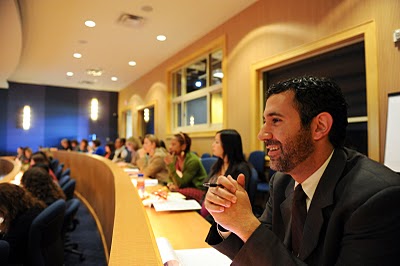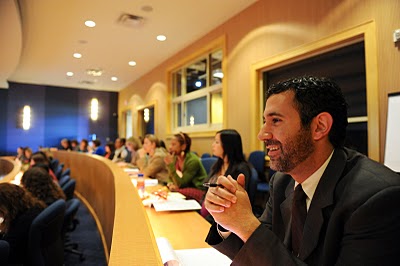November 29, 2010 at 2:00 pm
· Filed under Career Resources, News and Developments, Public Interest Jobs, The Legal Industry and Economy
Need a job or internship? During the past week PSLawNet has posted: 21 new attorney positions, 12
Featured New Positions:
The Harris County Public Defender is currently hiring for both an Assistant Public Defender to serve as Division Chief for their Mental Health Division and an Assistant Public Defender to serve as Division Chief of their Appellate Division. Harris County, Texas hired its first public defender earlier this month and the office is gearing up to begin operations in 2011 (Read local coverage from Houston and check out our earlier coverage of this issue in the June 11, 2010 issue of the Public Interest News Bulletin).
The Urban Justice Center’s Community Development Project (CDP) is currently seeking law student interns interested in working with them in Summer 2011 to protect the rights of low-income people and to provide legal and technical assistance to advance diverse community development projects. The CDP provides legal, technical, research, and policy support to community-based organizations working to improve conditions in low-income communities in New York City. Applications are being accepted on a rolling basis, but must be received by January 10, 2011. Check PSLawNet for additional details about the internships and application instructions.
Featured Public Service Career Resource:
Considering a career as a public defender? The University of Virginia School of Law has shared their How to Get a Job in a Public Defender’s Office guide with PSLawNet’s Public Service Career Library. The guide is designed to help students decide if they would like a career as a public defender. It was also created to assist committed students in successfully landing a job at a defender’s office. Among other features, this publication includes information on how to choose the right public defender’s office for you, how to develop a public defender resume, and how to prepare for a public an interview for a public defender’s office. Check it out.
Learn more about getting a PSLawNet job seeker or employer account . . .
Permalink
November 24, 2010 at 4:30 pm
· Filed under Career Resources, The Legal Industry and Economy
In the current economic climate, as a public interest lawyer it is more important than ever to expand and strengthen the skill set you bring to employers. At our annual NALP/PSLawNet Public Service Mini-Conference, Alejandro T. Reyes, associate counsel for the Lawyers Committee for Civil Rights Under Law, highlighted the need that exists for Spanish-speaking attorneys and recommended law students and lawyers consider a two-week immersion program in Latin America.
After a guest post earlier this month from Leeor Neta, that shared this piece of advice about immersion programs the PSLawNet Blog was asked about how to find credible and affordable programs. We researched the issue as promised and here are a few recommendations we received for reputable programs:
- Intercultura Language School and Cultural Center (Heredia and Samara Beach, Costa Rica): This program was recommended to one-half of the PSLawNet Blog by her friend who is a teacher in Seattle and attended a program at the school a couple of years ago. He really enjoyed the experience and highly recommends the program.
From their website: The primary goal of Intercultura is to teach you the Spanish language in a warm yet intellectually challenging environment. Classes at our city and beach campuses are conducted entirely in Spanish, providing students from all over the world with a complete and intensive learning experience. Our professors have advanced university degrees and teaching certification, and we are accredited through the US university system, offering undergraduate credit to those interested. In addition, you have the opportunity to come to know Costa Rica, its traditions and its rich cultural heritage by participating in our daily cultural and extracurricular activities.
- ICA Language School (Xela, Guatemala): This recommendation comes from a D.C. attorney who attended the program. She characterized the program as “very intensive 1:1 training” and “felt [she] learned a lot.”
From their website: The Instituto Central America (I.C.A.), founded in 1976, is the first Spanish school in Quetzaltenango to be fully accredited by the Guatemalan Ministry of Education (MINEDUC) and the Guatemalan tourist institute (INGUAT). We offer a personalized learning program with one-on-one instruction to students of all levels. Every teacher at I.C.A. offers years of experience and training, a private classroom for each student-teacher pair and we use our very own textbook, researched and written by our teachers.
Our instructors are professionals with extensive knowledge of grammar and experience in methods, techniques, and activities to apply what you learn in the classroom in the real world. In addition, all of our teachers participated in the Diploma for Teachers Specialized to Teach Spanish as a Second Language given and evaluated by the San Carlos University, the Ministry of Education, and the Tourist Institute of Guatemala, to name a few of the institutions involved.
- Convinced that Guatemala is the destination for you? Check out Guatemala365. This site was recommended to us by another D.C. attorney and lists “about 30 selected Spanish schools in different towns of Guatemala. There are photos and descriptions that charactarize these schools.” Guatemala365 “selected and ranked [schools] based on reports of over 1000 students.” The site also provides you with information about how to apply for the various programs and advice for planning your travel.
Through searching “the internets” we also came across the following sites that may be of assistance to you if you are looking for immersion programs.
Permalink
November 22, 2010 at 5:20 pm
· Filed under Career Resources, Public Interest Jobs
Need a job or internship? During the past week PSLawNet has posted: 75 new attorney positions, 49 internships, and 19 law related opportunities. Additionally, there are currently 1,267 active opportunities in our job database. To search the database visit PSLawNet. 
Featured New Positions:
East Bay Community Law Center (EBCLC) is seeking full-time law student interns for its 2011 Summer Program. EBCLC is a nationally-recognized poverty law clinic founded by Boalt students in 1988 with the dual mission of providing high quality legal services to low-income clients and first-rate clinical education to law students. EBCLC provides free civil legal services to low-income clients of Alameda County, California.
EBCLC is the community-based clinic for Berkeley Law School (University of California, Boalt Hall) during the academic year. During our summer session, EBCLC welcomes students from all law schools.
Featured Public Service Career Resource:
Believe it or not, it is possible to work as a full-time public interest attorney with a . . . gasp . . . for-profit law firm. While still considered a niche practice, many “public interest law firms” represent individuals, groups (such as labor unions and member associations), and government bodies on myriad legal matters, including employment and housing discrimination, labor issues, land use and property rights, and much more. The Center for Public Interest Law at
Columbia Law School (CPIL) and Harvard Law School Office of Public Interest Advising shared their Private Public Interest and Plaintiff’s Firm Guide with the PSLawNet’s Public Service Career Library. Check it out.
Learn more about getting a PSLawNet job seeker or employer account . . .
Permalink
November 17, 2010 at 9:00 am
· Filed under Career Resources, Public Interest Jobs
According to the National Career Development Association, today is National Career Development Day. It happens to fall in the middle of National Career Development Week (Nov. 15-19), which itself is situated right smack in the heart of National Career Development Month (yes, November). It’s quite ambitious, we think, to declare a celebratory month, week, and day. Nonetheless, career development is extraordinarily important for law students. And since public interest hiring season is approaching, we wanted to mark the occasion with a couple of points:
- 1Ls, in case the date (understandably) passed you by amidst your efforts to master such concepts as nonmutual collateral estoppel and proximate causation, Nov. 1 marked the point at which you were able to begin meeting with your schools’ career development professionals. (See NALP’s Principles and Standards for Law Placement and Recruitment Activities, Part V(D) – bottom of page.) On December 1, you will be able to initiate contact with employers. We at the PSLawNet Blog have mixed feelings about 1Ls focusing much, if at all, on the job search during 1st semester. In a perfect world, you would spend the entire semester learning how to be law students. We recognize, though, that the poor job market has many of you feeling ill at ease. So for those who wish to take the plunge, we wish to convey how strongly we feel that setting up a meeting with career services is the best starting point. Your author was very stubborn in school and fashioned himself a sort of rogue public-interest student. Even though my school had a stand-alone public interest career office, I didn’t set foot in it. This was really, really dumb. I was able to find a summer job only because of some public interest work experience I’d gotten before school. But I was operating with tunnel vision and had no idea about the broad array of practice settings that were open to me as a job applicant. Had I met with career services, I’d have cast a much wider net in choosing where to apply. And, on account of my stubbornness later in law school, I was hopelessly out of touch with the timeline to apply for postgraduate fellowships – something I still regret, and something my public interest career advisor could easily have clued me in on. Finally, I don’t even want to think about what my cover letter and resume looked like without a trained set of eyes having reviewed them. In retrospect, I got my 1L summer job in spite of my job search skills, not because of them.
- Many 2Ls and 3Ls may already be hard at work on summer and postgraduate job applications, respectively. I strongly encourage you to check in with your career services office (even, no, especially, if it’s for the first time). And take advantage of PSLawNet’s career search resources on cover letters, resumes, and interviews, as well as our public interest career fairs calendar.
Good luck, and if there is anything we can provide to make things easier – short of a more rapid economic turnaround – please let us know.












Permalink
November 15, 2010 at 3:01 pm
· Filed under Career Resources, Public Interest Jobs, The Legal Industry and Economy
Need a job or internship? During the past week PSLawNet has posted: 45 new attorney positions, 48 internships, and 20 law related opportunities. Additionally, there are currently 1,222 active opportunities in our job database. To search the database visit PSLawNet.
Featured New Positions:
The Massachusetts Law Reform Institute (MLRI) has just begun their search for a new Executive Director following the announcement from their Executive Director of 41 years that he will retire at the end of t his year. MLRI is a statewide legal advocacy and support center whose mission is to promote economic, racial and social justice for low-income people through legal action, education and advocacy. The organization is seeking a talented new leader to partner with its Board, staff, valued constituents and supporters in championing the rights and opportunities of low-income people at a time of significant economic and social challenge. Check PSLawNet for application details.
The Polaris Project is current seeking law students to serve as Senior Legal and Policy Fellows in their Policy and Legal Department. Fellows will assist with advocacy and policy development for stronger comprehensive state and federal laws on human trafficking. Responsibilities include: conducting legal and statutory research, monitoring pending legislation, preparing legislative outreach materials, including action alerts, advocate and legislator briefs, communicating and providing assistance to legislators and other policy makers, providing technical assistance during the bill drafting process, and helping to build and assist coalitions in support of legislation. Responsibilities may also include direct lobbying, outreach and the preparation of training materials for law enforcement and others. Deadline: December 24, 2010. Check PSLawNet for application details.
Featured Public Service Career Resource:
Do you have an interest in working for State or Local Government? Just like the federal government, state and local government attorneys handle a broad range of legal issues and are housed in the executive, legislative, and judicial branches of government. State/local government attorneys craft policy, draft laws and rules, advise elected and appointed officials, and represent the interests of citizens in court.
Each state and local government organization has unique hiring practices, thus it is best to research each locale to see what types of positions exist and learn about hiring policies, etc. On our State and Local Government Resources page we have links to state/local government resources by state and additional resources to guide your job search. Check it out.

Learn more about getting a PSLawNet job seeker or employer account . . .
Permalink
November 10, 2010 at 12:34 pm
· Filed under Career Resources, Public Interest Jobs
Today’s guest post is shared by Leeor Neta, the Assistant Director for Public Interest Programs at Golden Gate University School of Law. After attending the 2010 NALP/PSLawNet Public Service Mini-Conference and EJW Conference and Career Fair he is sharing key insights from programming he attended at both conferences on GGU’s Law Career Services Blog. (Read Part 1)
 Finding and Making the Most of a Mentor
Finding and Making the Most of a Mentor
On the last day of the conference, I attended a session on how to find and maintain a mentor relationship. The speaker explained that there are three ingredients to successful mentorship: (1) reasonable expectations, (2) a strategic approach, and (3) a two-way relationship.
In order to ensure that one’s expectations are reasonable, mentees should ask themselves specifically what they are hoping to get out of the relationship. The mentor relationship cannot just be designed to find the mentee a job, but it can be designed to help the mentee acquire skills, act as a sounding board for the mentee, and offer answers to specific questions the mentee might have. Because no one mentor can do everything, mentees should “build a board of mentors”, each one of whom is available to provide advice and support on a specific topic.
Finding multiple mentors requires some strategic thinking, and that means planning where to find mentors and how to approach them. Everyone agreed that students need to create LinkedIn profiles and use keyword searches to identify potential mentors. Indeed, one of the attorneys in attendance confessed that she found a job through her LinkedIn profile.
Once a mentor is found, the mentee needs to make sure that the relationship remains “a two way street.” What that means is that mentees need to think about what they bring to the relationship — whether it be a certain kind of energy, a different perspective, or even knowledge about social media advocacy — and offer themselves as resources to their mentors.
Keep reading about student debt relief and equal access to justice issues . . .
Permalink
November 8, 2010 at 5:10 pm
· Filed under Career Resources, Public Interest Jobs
A new recurring feature on the PSLawNet Blog will be our weekly “PSLawNet Jobs Report” that will highlight new job opportunities posted on PSLawNet and public service career resources.
Need a job or internship? During the past week PSLawNet has posted: 85 new attorney positions, 55 internships, and 15 law related opportunities. Additionally, there are currently 1140 active opportunities in our job database. To search the database visit PSLawNet.
Featured New Positions:
Refugee and Immigrant Center for Education and Legal Services (RAICES) is a currently accepting applicants for a full-time staff attorney position, available immediately. RAICES is a Texas-based 501(c)(3) organization that promotes justice by providing free and low-cost immigration legal services and education to underserved immigrant children, families and refugees in Central and South Texas. Check PSLawNet for application details.
The Vera Institute of Justice is currently seeking interns to work closely with a small team of Vera program staff on projects that aim to improve immigrants’ access to justice. Current programs include a legal orientation program to provide detained individuals in removal proceedings with legal information, pro se assistance and access to pro bono legal services; a program to provide unaccompanied children in the United States with legal information and access to pro bono legal counsel; a program that trains law enforcement on the use of the U-visa; a program that is assessing promising police-immigrant relations practices; and technical assistance/consulting activities to assist police departments and other government agencies in overcoming language barriers and serving immigrant communities. The Vera Institute of Justice combines expertise in research, demonstration projects, and technical assistance to help leaders in government and civil society improve the systems people rely on for justice and safety. Check PSLawNet for application details.
Featured Public Service Career Resource:
Finding and Funding International Public Interest Opportunities is an online guide that provides background info and recommendations for students/attorneys embarking on international public interest careers. It is annually updated by NALP members at the Universities of Arizona and Georgia, and at the William & Mary School of Law. Download the guide.
Learn more about getting a PSLawNet job seeker or employer account . . .
Permalink
November 5, 2010 at 9:09 am
· Filed under Career Resources, Legal Education, News and Developments, Public Interest Jobs, The Legal Industry and Economy
This week: Strong demand for legal services in South Carolina; $350K from DOJ to law school for veterans clinic; 3 deferred law firm associates wrap up their public interest placements; in “brave people taking tough jobs” news, Missouri to get a new public defender; what will a Republican House do to the federal workforce?; loan assistance for U. of Tennessee public interest grads; foreclosure clinics in Kentucky; loan assistance for South Dakota prosecutors and defenders; the Wyoming Access to Justice Commission launches a new legal services program; a new DOJ program brings together law schools, firms, and public interest offices to combat domestic violence.
- 11.3.10 – just FYI South Carolina’s Greenville News is a running a subscription-only article entitled “Legal Services Faces Big Demand in Tough Times.” We seem to have let our Greenville News subscription lapse, but if you’ve got one…
Keep reading the bulletin . . .
Permalink
November 1, 2010 at 12:27 pm
· Filed under Career Resources, Public Interest Jobs
Today’s guest post is shared by Leeor Neta, the Assistant Director for Public Interest Programs at Golden Gate University School of Law. After attending the 2010 NALP/PSLawNet Public Service Mini-Conference and EJW Conference and Career Fair he is sharing key insights from programming he attended at both conferences on GGU’s Law Career Services Blog. 
Best Advice I Know on Pursuing a Public Interest Career
On the last day of the NALP / PSLawNet Public Service Mini-Conference, I attended a panel discussion that indirectly shared some important advice on how to pursue a public interest career. I say that the advice was “indirectly shared” because the purpose of the panel was to discuss pathways to public policy and think tank careers. Two of the four panelists (Nicole Austin-Hillery, director and counsel for the Brennan Center for Justice, and Alejandro T. Reyes, associate counsel for the Lawyers Committee for Civil Rights Under Law) are involved in some of the most prestigious impact litigation and legal policy work in the nation.
Both of the panelists agreed that lawyers who work on policy need to understand the nexus between law and enforcement. In concluding that the “best policy percolates up from the street,” Ms. Austin-Hillery explained that a policy lawyer can’t craft effective policy unless she understands her clients and understands how to get them to tell their stories. A policy lawyer needs to make brief and effective arguments under pressure. A policy lawyer also needs to know how to work with opposing forces and different interests to negotiate on her clients’ behalf. Because effective communication and negotiation skills are the key to policy work, the entire panel agreed that a lawyer wanting to work on policy needs a solid foundation in litigation.
The panel also suggested that law students interested in policy work try to work for state legislatures, researching and helping to draft proposed legislation. International work experience, moot courts, and writing opportunities are also considered important. Everyone agreed that working for the Administrative Office of the Courts and State Bar Associations were ideal — and less competitive — ways to acquire policy work experience.
The panel’s best advice pertained to all aspiring public interest lawyers. First, they advised — as I have already done for many of you — that law students identify five to ten offices that they would like to work for and try to join their advisory boards. Many of those offices might need independent legal advice and the work that one does as a board member is a great way to leverage an employment offer once a position opens up. Students should consider a two-week immersion program, some of which are extremely affordable (one of the panelists described a program in Mexico that costs less than $800!).
Finally, the entire panel agreed that the best candidates for entry-level positions demonstrate through their resumes and cover letters that they were born to pursue the job for which they’re applying. Their resumes demonstrate a seamless progression of attention and commitment to a specific area. Therefore, “the sooner you can decide what it is you want to do with your legal career, the better prepared you will be when you apply for your first job.”
Keep reading to learn about postgraduate fellowship opportunities . . .
Permalink
October 1, 2010 at 9:31 am
· Filed under Career Resources, News and Developments, Public Interest Jobs, The Legal Industry and Economy
This week: lots of coverage about hearings on legal services funding in New York; a “Civil Gideon” proposal in Wisconsin; $3.62 million in cy pres funding will benefit legal services providers, mostly in Illinois; changing the beleaguered Michigan public defense infrastructure?; turning a federal internship into a federal job; Attorney General Holder tells the Senate to hurry up on judicial confirmations; a deferred associate looks back on his one-year public service placement; humanizing a defendant in a capital trial is no easy feat; a call for a legal services funding boost in Texas; making the wheels of justice turn more smoothly in Philly courts (and by the way, go Phils!); the Washington Post editorial board laments the state of indigent defense funding; a sobering, and hopefully effective, fundraising effort in Texas to curtail domestic violence; a new volunteer initiative driven by a Florida lawyer; and an Indiana prosecutor stands up for his office’s LRAP program.
call for a legal services funding boost in Texas; making the wheels of justice turn more smoothly in Philly courts (and by the way, go Phils!); the Washington Post editorial board laments the state of indigent defense funding; a sobering, and hopefully effective, fundraising effort in Texas to curtail domestic violence; a new volunteer initiative driven by a Florida lawyer; and an Indiana prosecutor stands up for his office’s LRAP program.
- 9.30.10 – a handful of news outlets from throughout the Empire State are reporting on a statewide series of hearings about access-to-justice issues. The hearings are the result of efforts by New York Chief Judge Jonathan Lippman to raise awareness about under-funding of civil legal services and to find solutions. The New York Times and the New York Law Journal report on the first of the four hearings, which took place in Manhattan. From the Times, we see half of the dilemma facing legal services providers: “Since 2008, there has been a 40 percent increase at the Legal Aid Society in requests for help on health care issues and an 800 percent increase in requests for help with foreclosures…” From the Law Journal, we see the other half: “Current funding is provided through what Judge Lippman called a ‘hodgepodge’ of mechanisms… Due to plunging interest rates because of the poor economy, IOLA revenues have dropped to $7 million this year from $32 million in 2008, and the other sources of aid have not made up the difference.” After the Manhattan hearing, a second one took place across the state in Rochester. Here’s coverage from the Rochester Democrat and Chronicle. Chief Judge Lippman’s end goal is to craft a formal report to use in urging the legislative and executive branches for increased financial support of civil legal services. The hearings are just the latest step in his campaign. Earlier this year Lippman created a high-level task force to explore how to expand civil legal services for low-income New Yorkers. He also created an “Attorney Emeritus” program through which retired lawyers can volunteer their time on pro bono matters. Indeed, Lippman has gone so far as to call for a civil right to counsel in some matters. Read more about his efforts in Item One of PSLawNet’s 6.11.10 Public Interest News Bulletin.
- 9.29.10 – the Chicago Daily Law Bulletin (subscription required – boo!) reports on a cy pres award that will benefit Illinois legal services providers as well as other providers throughout the country: “Organizations that help provide legal services to the poor in Illinois and legal aid groups around the country will receive $3.62 million in unclaimed funds from a nationwide class-action settlement involving a rate increase on life insurance policies. This week, five legal aid organizations and foundations serving Illinois are expected to receive a total of more than $1.8 million of the unclaimed funds from the $93 million settlement. Another $1.8 million is to be disbursed to 111 legal aid organizations serving other states throughout the country.” One of the Chicago-based beneficiaries is the Chicago Bar Foundation, and this makes the PSLawNet Blog happy because we’ve worked with CBF before and have great admiration for them. UPDATE: here’s freely accessible National Law Journal coverage.
- 9.29.10 – and in our third story in a row from the northern Midwest, the Michigan Campaign for Justice is advocating that the state “create a statewide public defense system” to replace the patchwork, county-by-county systems that exist now and which have been the subject of intense scrutiny. “A study commissioned by the state legislature on the public defense system gave Michigan failing grades in 2008 for the way defense attorneys provide counsel to indigent defendants…”, according to the Kalamazoo Gazette.
- 9.28.10 – speaking of the Post, in an op-ed Attorney General Eric Holder urges the Senate to move with more dispatch on federal judicial nominees. He recounts a few specific cases of relatively uncontroversial nominees waiting for months for confirmation hearings, and further notes that “[l]ast year, 259,000 civil cases and 75,000 criminal cases were filed in the federal courts, enough to tax the abilities of the judiciary even when it is fully staffed. But today there are 103 judicial vacancies — nearly one in eight seats on the bench. Men and women who need their day in court must stand in longer and longer lines. The problem is about to get worse. Because of projected retirements and other demographic changes, the number of annual new vacancies in the next decade will be 33 percent greater than in the past three decades. If the historic pace of Senate confirmations continues, one third of the federal judiciary will be vacant by 2020. If we stay on the pace that the Senate has set in the past two years — the slowest pace of confirmations in history — fully half the federal judiciary will be vacant by 2020.”
- 9.28.10 – Andrew Ardinger, a deferred law firm associate from the Class of 2009, has spent the past year in a public service placement with the Oakland-based Public Interest Law Project. He’s been submitting articles periodically about his experience to the American Lawyer. Here’s his final AmLaw piece before returning the law firm world. Ardinger reviews his experience with PILP, which seems to have been overwhelmingly positive: “On a professional development level, too, this experience has been outstanding. As I have noted before, there are only six attorneys in the office, and one legal assistant. It was a very warm, genial work environment, and the two attorneys with whom I worked most closely were, from the first day, obviously committed to mentoring me and helping me develop as an attorney.” Ardinger’s experience was pretty hands-on; he drafted motions/pleadings, made some court appearances, and forged relationships with clients. The PSLawNet Blog has been following the deferred-associates-in-public-service-placements phenomenon closely. See our recent post on the issue, which tracks back to some of our past coverage.
- 9.27.10 – courtesy of Connecticut’s Middletown Press, here’s a pretty interesting story about capital-case trial strategy. While the case is still in the trial phase now, prosecutors intend to seek the death penalty in the event of a guilty verdict. The story emphasizes the public defender’s apparent goal of highlighting mitigating factors and humanizing a man who’s accused of doing some terrible things during a home invasion. Seems like an uphill battle given the facts.
- 9.25.10 – the Houston Chronicle is late to the party, picking up an op-ed from Texas Supreme Court Justice Nathan Hecht that originally ran in the Cherokeean Herald, which not only got the drop on the Chron but has a much cooler name. In the piece, which we included in last week’s News Bulletin, Hecht laments the decline in legal services funding and, while acknowledging budgetary constraints, argues that the state legislature should appropriate funds to support the legal services community.
Permalink





















